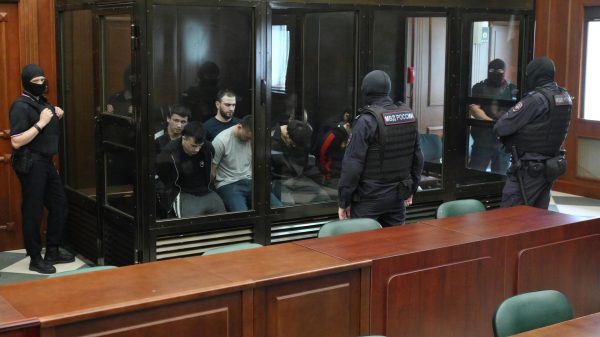At a time when strange alliances are disrupting previously stable democracies, the Catalan independence referendum was a perfect reflection of a weird age. Along with the flag-waving and calls for “freedom” from Madrid, the furore that followed the vote unleashed some of the darker elements that have haunted recent turbulent episodes in Europe and America: fake news, Russian mischief and, marching oddly in step, libertarian activism.
From his residence of more than five years inside the Ecuadorian embassy in London, Assange tweeted 80 times in support of Catalan secession, and his views were amplified by the state-run Russian news agency, Sputnik, making him the most quoted English-language voice on Twitter, according to independent research and the Sydney Morning Herald.
Jared Kushner failed to disclose emails sent to Trump team about WikiLeaks and Russia
Read more
In second place was Edward Snowden, another champion of transparency, who like Assange had little by way of a track record on Spanish politics. Together, Snowden and Assange accounted for a third of all Twitter traffic under the #Catalonia hashtag.
At the same time, a European Union counter-propaganda unit detected an upsurge in pro-Kremlin fake news on the political crisis, playing up the tensions.
“World powers prepare for war in Europe,” one Russian politics site declared in its headline.
The same patterns were apparent in the Brexit vote, Donald Trump’s shock victory, the surge of the Front National in France and the dramatic ascent of the Five Star Movement in Italy, from the pet project of a comedian, Beppe Grillo, to the second most powerful force in Italy.
In all cases, libertarians viscerally opposed to centralised power made common cause with a brutally autocratic state apparatus in Moscow, an American plutocrat with a deeply murky financial record, and the instinctively authoritarian far right. All in the name of disruption of government and liberal norms in western democracies.
So why are the pioneering crusaders of total transparency and freedom of information lining up alongside the most powerful exponents of disinformation and disruption?
This has not just been a marriage of convenience. There are elements of ideological bonding too. In Twitter direct messages during the last throes of the US election campaign, released over the past week, WikiLeaks, which US intelligence has deemed a tool of Russian intelligence, attempted to woo Trump’s eldest son, Donald Trump Jr, with offers of secret collusion.
The messages from the official WikiLeaks account, first published in the Atlantic, ask for a leak of the future president’s tax return to soften the blow of its eventual publication, and to give WikiLeaks the appearance of impartiality given it had already released a trove of documents hacked from the Democratic party (by Russia, according to US intelligence).
Donald Jr only replied occasionally to the WikiLeaks emails, but appears in some case to have acted on them, notifying colleagues. In one instance, his father tweeted a reference to WikiLeaks 15 minutes after the group had been in touch.
WikiLeaks grew steadily bolder in its proposals, urging the Trump campaign not to concede on election night if he lost but to challenge the result as rigged. And in mid-December, when Trump was president-elect, it suggested Trump should push for Assange to be made Australian ambassador to Washington.
Assange also gave his backing to the Brexit vote in the UK, an intervention which again does not appear to be merely incidental. It earned him an unannounced visit in March from Nigel Farage, the Brexit leader and Trump’s closest British ally. When doorstopped on his way out of the Ecuadorian embassy, Farage claimed he could not remember why he had gone there.
In recent weeks, it has become increasingly clear that Brexit was another arena in which Assange and Moscow were in step. Over the past week, researchers at the University of Edinburgh identified more than 400 fake Twitter accounts apparently run from St Petersburg, which published Brexit-related posts in the run-up to the UK referendum, some of them aimed at stirring anti-Islamic sentiment.
They’re completely at odds with each other in every other sense but share a hatred of establishment western politics
Jamie Bartlett, Demos
“The radical libertarians and the autocrats are allied by virtue of sharing an enemy which is the mainstream, soft, establishment, liberal politics,” said Jamie Bartlett, the director of the centre for the analysis of social media at the Demos thinktank.
“Most early, hardline cryptographers who were part of this movement in the 1990s considered that democracy and liberty were not really compatible. Like most radical libertarians – as Assange was – the principal enemy was the soft democrats who were imposing the will of the majority on the minority and who didn’t really believe in genuine, absolute freedom.”
That meant some odd bedfellows could become useful allies. “They have been able to forge a very convenient marriage with other enemies of liberal democracy,” said Bartlett, “who are in every other sense imaginable completely at odds with each other, but they do share that common hatred of establishment, western, soft, democratic politics as they see it.”
Edward Snowden’s worldview also had libertarian roots. He was a supporter of the rightwing maverick US presidential candidate, Ron Paul, and vigorously opposed the Obama administration’s endorsement of gun control and affirmative action.
He turned against his employers in the US security apparatus, and stole their secrets in the name of transparency and the citizen’s right to privacy, but his defection has left him in exile in Moscow, at the mercy of a government that hardly even pretends to observe such western niceties.
However, Snowden has never professed any great enthusiasm for Russian governance, and most of the available evidence suggests he did not end up in Russia by design, but because of a failed scheme, hatched by WikiLeaks to fly him from Hong Kong to Latin America. Unlike Assange, he has been increasingly critical of the Kremlin.
But there are plenty of other examples of the mutual embrace between Moscow and western libertarianism. In particular, the libertarians share with Moscow a profound distaste for the European Union, which they see as a continent-wide epitome of centralisation, and of liberal social norms.
“This libertarian hatred of political correctness, that everyone has to follow this social democratic view on gender, welfare, progressive politics and immigration, and libertarians can’t stand that, as degrading the idea of individual liberty,” Bartlett said. “So I think you’ll find quite a lot of people on the libertarian right who think that Russia has become the only real counterbalance to that philosophy.”
The meeting of minds is embodied in the man long seen as Trump’s chief ideologue, Steve Bannon. Bannon is another western libertarian for whom the contradiction between opposing restrictions on individual liberties at home and backing Russian authoritarianism is subsumed beneath an admiration for Putin’s muscular nationalism.
In the summer of 2014, Bannon explained the attraction of the Russian leader for “traditionalists”, to a meeting of conservative Catholics through a Skype link to the Vatican.
“One of the reasons is that they believe that at least Putin is standing up for traditional institutions, and he’s trying to do it in a form of nationalism – and I think that people, particularly in certain countries, want to see sovereignty for their country, they want to see nationalism for their country,” Bannon said, according to a transcript of the discussion published by BuzzFeed.
“They don’t believe in this kind of pan-European Union or they don’t believe in the centralized government in the United States. They’d rather see more of a states-based entity that the founders originally set up where freedoms were controlled at the local level.”
For Farage too, reverence for Putin’s boldness on the world stage has outweighed doubts about his repressive rule. Asked in a 2014 GQ magazine interview, which world leader he most admired, he said: “As an operator, but not as a human being, I would say Putin.
“The way he played the whole Syria thing. Brilliant. Not that I approve of him politically. How many journalists in jail now?”
The investigation into the Russian involvement in the Brexit vote is only now getting started. Russian journalist Alexey Kovalev argues Moscow’s influence has been overstated and misunderstood.
Pointing to the minimal audience for the Russian English-language TV channel, Kovalev wrote: “Russian trolling operations seem less like pouring gasoline on fire and more like pouring a bucket of water into the ocean.”
Catalan independence: EU experts detect rise in pro-Kremlin false claims
Read more
Kadri Liik, an expert on Russian-European relations, said: “Some fake news probably may have influenced the Brexit vote, but these fake news were manufactured by the British tabloids and the leave campaign. Any amplification provided by Russia’s agents was negligible compared to the energy that was invested locally.”
In Catalonia too, Russian bots and their fake news output were pushing on a door that was already swinging open because of other circumstances. The Catalan leaders, unlike those in the US, France, and the UK have shown little interest so far in reciprocating Moscow’s embrace.
However, the long-term corrosive effect of Russia’s use of disinformation to break down trust in western institutions is hard to measure and may be unmeasurable. What is clear is that it is continuing with the active assistance of political movements who trade in disillusion and resentment, and who have found a natural home on the internet.
In Italy, the Five Star Movement (M5S), combines its anti-establishment stance at home with close alignment to Moscow’s line in foreign policy. Its web guru, Gianroberto Casaleggio, who claims that M5S is pioneering “a new, direct democracy that will see the elimination of all barriers between the citizen and the state”, has established news sites that circulate conspiracy theories, many of them crossposted from Russian outlets. One such story suggested the US was covertly funding the flow of immigrants from Africa. It linked back to a story on Sputnik Italia.
As with Assange, Casaleggio’s distaste for the overbearing state does not apply to Moscow. The common fight against US, Nato and the rest of the western world’s liberal order is what has taken primacy.
“I think they’re more anarchic in their belief that the state will wither away and power will be redistributed in some fundamentally democratic revolution that they thought would be embedded within the internet,” said Franklin Foer, a US journalist and the author of World Without Mind: The Existential Threat of Big Tech. “It’s fairly naive, because power always reasserts itself.”





















































Свежие комментарии